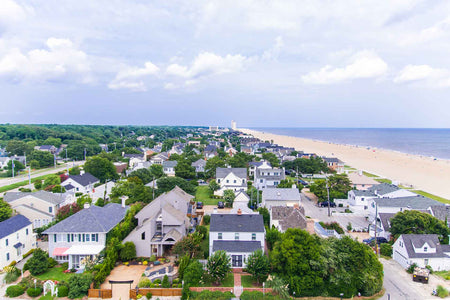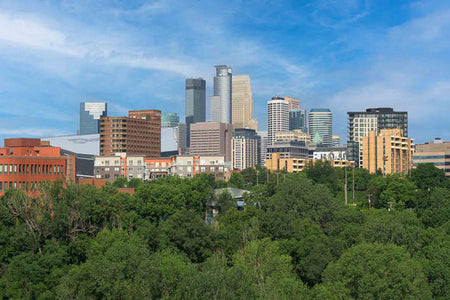- Allergy season in Michigan spans from late March to mid-November, with tree, grass, and weed pollen peaking at different times.
- Common allergens include tree pollen (oak, birch, maple), grass pollen (ryegrass, Bermuda grass), and ragweed.
- Be proactive in managing symptoms by tracking pollen counts and using nasal sprays like Allermi for enhanced relief.
If you've ever stepped outside on a crisp spring morning in Michigan, only to find your car coated in a fine yellow dust, you're not alone. That telltale layer of pollen signals the start of a season that many residents dread—when sneezes, itchy eyes, and endless tissues become part of daily life [*].
Allergy season in Michigan isn't just about spring blooms. It stretches across multiple months, and various allergens take their turn in making life uncomfortable.
This article covers Michigan’s pollen season in 2025, including its start, peak, and end. We’ll highlight the worst months for allergies, common allergens (pollen and non-pollen), and share tips to help you stay prepared.
When is the Pollen Season in Michigan?
Pollen season in Michigan varies slightly across regions due to differences in climate and vegetation.
In southern Michigan, tree pollen starts in late March or early April, peaking in April and May. Grass pollen follows from late May to mid-July, with its peak in June. Ragweed, the main source of weed pollen, is most active from late August through early October.
In central Michigan, tree pollen starts slightly later, in early to mid-April, and peaks in May. Grass pollen activity occurs from late May to early July, peaking in mid to late June, while weed pollen peaks from late August to early October.
Northern Michigan has a later start to the pollen season because of cooler spring temperatures. Tree pollen begins in late April and peaks in May or early June. Grass pollen is active from early June through mid-July, and weed pollen peaks from early September to mid-October, with the season ending earlier due to frost.
What are the Worst Months for Allergies in Michigan?
While spring might get most of the attention, Michigan’s allergy season spans the entire year, and each season introduces new allergens to contend with.
- Spring (April to June). Tree pollen is one of the biggest culprits during spring. Common trees like oak, birch, maple, and cedar release a lot of pollen, which can cause seasonal allergic rhinitis or hay fever.
- Summer (Jun to August). Grass pollen peaks during the late spring and early summer months, making this another tough period for those with allergies. Ryegrass, Bermuda grass, and other grasses such as Timothy grass and Kentucky bluegrass, contribute to the pollen load.
- Fall (August to November). Ragweed pollen is the main allergen in late summer through fall. It’s one of the most common causes of fall allergies [*]. Ragweed thrives in fields, roadsides, and other open areas. It is also lightweight and can travel hundreds of miles on the wind.
- Late Fall to Winter (November to February). During these months, indoor allergens become more problematic, including dust mites, pet dander, and mold. While these allergens are not sources of pollen, they are still worth mentioning because they can trigger allergy symptoms, especially as people spend more time indoors to escape Michigan’s cold weather.
While allergy symptoms can vary, the months of April through October are generally the most problematic for people with seasonal allergies in Michigan.
When Does Pollen Season End in Michigan?
Pollen season in Michigan generally ends in mid-November. As temperatures drop and frost sets in, trees, grasses, and weeds stop releasing pollen. This significantly reduces outdoor allergen levels.
However, while outdoor pollen becomes less of a concern during the winter, indoor allergens like dust mites, pet dander, and mold may still trigger symptoms for some individuals.
Common Allergens in Michigan
From outdoor pollen sources to indoor irritants, understanding the most common allergens can help you prepare and manage your symptoms. Here’s a closer look at the primary culprits:
- Oak
- Birch
- Maple
- Cedar
- Ryegrass
- Bermuda grass
- Timothy grass
- Ragweed
- Mold
- Dust mites
- Pet dander
How to Prepare for Seasonal Allergies in Michigan
Managing allergies in Michigan doesn't have to feel overwhelming. Here’s how to take control of your allergies and breathe easier year-round:
- Track pollen forecasts. Keep an eye on local pollen counts and forecasts. On high pollen days, try to limit outdoor activities, especially during peak pollen hours (early morning and evening).
- Keep windows closed. During peak allergy season, especially in the spring and fall, keep windows in your home and car closed to prevent pollen from entering. Use air conditioning with a clean filter to maintain airflow and cool your living space.
- Shower and change clothes after being outdoors. Pollen can stick to your skin, hair, and clothes. After spending time outside, shower and change your clothes to remove any pollen that could trigger allergic reactions.
- Use HEPA filters. Invest in high-efficiency particulate air (HEPA) filters for your home, especially for your bedroom and living spaces. These filters can help trap airborne allergens like pollen and dust mites.
- Take preventative medications. Consult with a healthcare provider about over-the-counter antihistamines, nasal sprays, or eye drops to manage symptoms early. For a more effective option, Allermi nasal spray combines antihistamine, micro-dosed decongestant, anti-discharge, and anti-inflammatory ingredients, which provides enhanced relief with fewer side effects.
- Clean your home regularly. Regular cleaning can help minimize indoor allergens like dust mites and pet dander. Vacuum frequently using a vacuum with a HEPA filter, and wash bedding, curtains, and upholstered furniture often.
- Consider allergy shots or Immunotherapy. For individuals with severe allergies, allergy shots (immunotherapy) can be an effective long-term treatment to reduce sensitivity to allergens.
You can reduce the impact of seasonal allergies and enjoy Michigan's changing seasons with fewer symptoms by preparing early.
The Bottom Line
Allergy season in Michigan may stretch across multiple months, but it's important to remember that you don’t have to let allergies control your life. Certain months may feel particularly challenging, but preparing in advance and knowing when to take action can help you breathe easier.
References:
- POLLEN: A naturally occurring phenomenon. (n.d.). https://www.michigan.gov/egle/about/organization/water-resources/glwarm/naturally-occurring-phenomena/pollen
- Ragweed plants packed with pollen. (n.d.-b). https://www.aaaai.org/tools-for-the-public/conditions-library/allergies/ragweed









